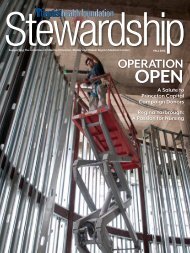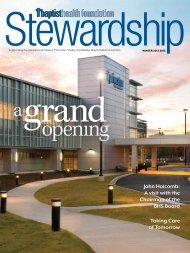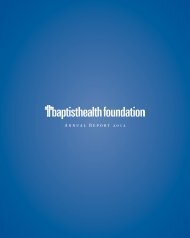Spring/Summer 2013 - Baptist Health Foundation
Spring/Summer 2013 - Baptist Health Foundation
Spring/Summer 2013 - Baptist Health Foundation
You also want an ePaper? Increase the reach of your titles
YUMPU automatically turns print PDFs into web optimized ePapers that Google loves.
featurestoryLeading the new initiativewith Pam James (center),nurse practitionerand manager ofmammography and theBreast Care Center,are (left) Marla Ford,clinical navigator, and(right) Teneramie Hall,resource navigator.navigating the path ofsurvıvorshipNew initiative at Princeton <strong>Baptist</strong>tguides breast cancer patientsGrant makes“next step” possiblePrinceton <strong>Baptist</strong> Medical Center’s BreastCare Center has remained ahead of thecurve when it comes to diagnosis, treatmentand follow-up care of breast cancerpatients using a high-touch, personalizedapproach to caring for women who findthemselves in a life-altering situation. Sowhen the Women’s Breast <strong>Health</strong> Fundof the Community <strong>Foundation</strong> of GreaterBirmingham was looking for an organizationto implement a Breast CancerResource and Survivorship Network viaa specific grant for a Navigator program,Princeton <strong>Baptist</strong> was a logical fit.Terri Lamons, executive directorof imaging services and neuroscienceat Princeton, recalls the meeting thatpreceded the launch. “When the Women’sBreast <strong>Health</strong> Fund group visited ourBreast Care Center, their first reaction was‘This place has a different feel to it.’ Theyrealized right away that implementing theNavigation program would not be a cultureshift for us. The culture was alreadyin tact at Princeton; Navigation was justa way to better streamline the servicesand the passion we already had for thesewomen.”Navigating the wayThe essence of the Navigator program isto guide women and their families as theynegotiate diagnosis, treatment and survivorshipof breast cancer, with the ultimategoal of increasing the patient’s qualityof life during recovery and on throughsurvivorship. To fully address the resourceneeds, the Navigator program was estab-by Jennifer JacksonThere is a new paradigm in the fight against breast cancer, and it’s an indicatorof positive progress. Survivorship is on the rise in a significant way—not only in the number of patientswho are surviving breast cancer, but also in the number of years women are living beyonddiagnosis with their pink badge of honor. But this new reality brings specialized needs: to care forthese women warriors with a proactive approach that provides access to resources. The Princeton<strong>Baptist</strong> Breast Care Center has stepped up to answer that call.lished as a collaborative strategic plan inpartnership with the Princeton <strong>Baptist</strong>Breast Care Center, the <strong>Baptist</strong> <strong>Health</strong><strong>Foundation</strong> and the Women’s Breast<strong>Health</strong> Fund through a grant provided bythe Community <strong>Foundation</strong> of GreaterBirmingham.Through the program, Princeton’sclinical navigator and resource navigatorwork in tandem to provide a continuumof care to women facing the uncertainpath that a breast cancer diagnosis creates,helping patients prepare for what liesahead. This one-stop resource center offersservice on both sides of the spectrum.The clinical navigator, Marla Ford, is aprofessional nurse experienced in workingspecifically with women suffering frombreast cancer and who understands thechallenges of treatment and survivorship.10 Stewardship<strong>Spring</strong>/<strong>Summer</strong> <strong>2013</strong> 11








